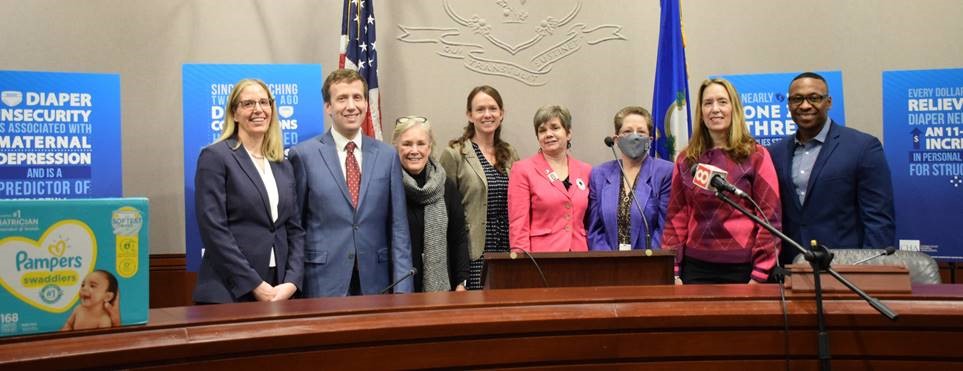Reducing Diaper Insecurity

Left to right: Dr. Megan Smith, Senior Director of Community Health Transformation at CHA; Senator Matt Lesser, Senate Chair of the Human Services Committee; Senator Ceci Maher; Representative Jillian Gilchrest, House Chair of the Human Services Committee; Representative Anne Hughes; Representative Mary Fortier; Janet Stolfi Alfano, Executive Director of the Diaper Bank of Connecticut;, and Maurice Edwards, a father of two and recipient of diapers through Yale-New Haven Hospital.
House Bill #6587, that will be heard next week, seeks to provide Medicaid coverage, to the extent permissible under federal law, for diapers.
Nearly one in three families struggle to afford diapers to keep their babies clean, dry, and healthy. Diaper insecurity is also associated with postpartum depressive symptoms and high rates of diaper rash for infants.
By making reimbursement for diapers an eligible medical expense, Connecticut can build upon the work of community organizations and programs like Diaper Connections – a diaper distribution network launched by the Connecticut Hospital Association (CHA), Connecticut’s 27 acute care hospitals, and the Diaper Bank of Connecticut, with support from the Connecticut Department of Housing – to improve the health of families by preventing adverse maternal and child health conditions associated with diaper need.
When a family lacks access to diapers it impacts their health and well-being. We have an opportunity to expand access and improve health conditions for a mom and her child. I am excited to see how many more families we can support by having Medicaid cover diapers.
“Since 2004, The Diaper Bank of Connecticut has been leading efforts to increase access to diapers for families in need across the state,” said Janet Stolfi Alfano, Executive Director of the Diaper Bank of Connecticut. “We've distributed well over 30 million diapers and yet there is even more unmet need. Ensuring diapers are covered under Medicaid is a logical next step, given the significant negative health outcomes and associated costs related to not having an adequate supply.
“Diapers are a material basic need, like food and shelter, and are essential to health and the economic success of families,” said Dr. Megan Smith, Senior Director of Community Health Transformation at CHA. “Specific to health, diaper need is related to several maternal and child health conditions, including maternal depression, poor infant sleep, infant and child urinary tract infections, and diaper dermatitis (known as “diaper rash”). Diapers are not a covered product under benefit programs like Women Infants and Children (WIC) and the Supplemental Nutrition Assistance Program (SNAP), yet they are a basic material need necessary for infant, child, and maternal health and an important structural factor related to a family’s ability to participate in the workforce.”
“CHA partnered with the Diaper Bank of Connecticut and the Connecticut Department of Housing to launch Diaper Connections, a diaper distribution network that has already provided diapers to more than 500 infants and 100 toddlers since launching two months ago,” said Selina A. Osei, Director of Health Equity and Community Engagement at CHA. “More can be done to further increase access. We strongly support this forward-looking proposal to address diaper insecurity through Medicaid coverage for diapers thereby advancing maternal and child health across the state.”





